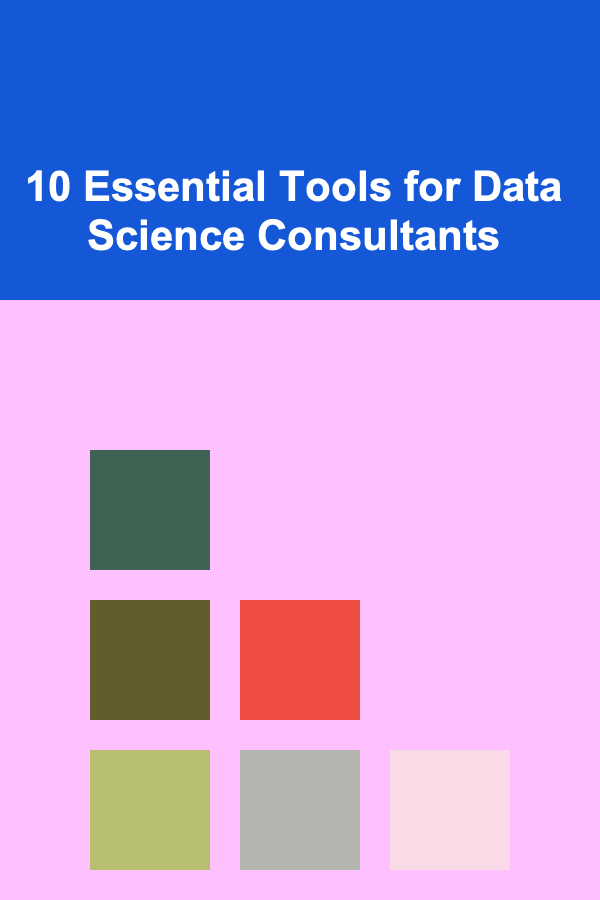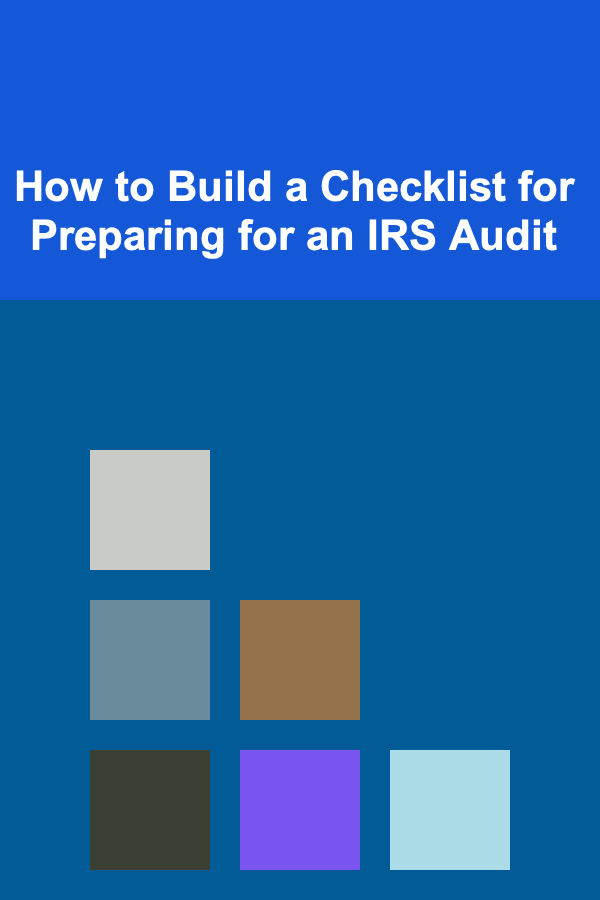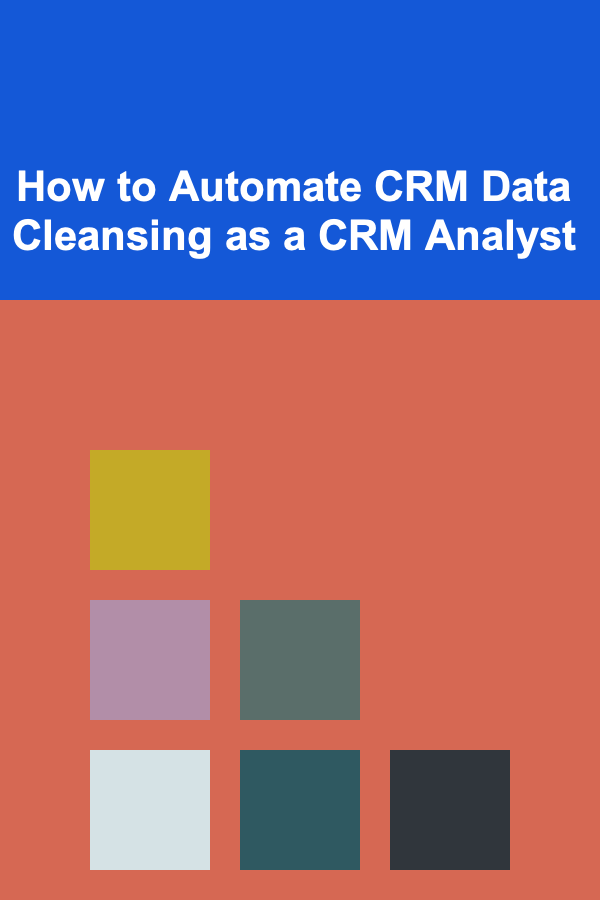
10 Essential Tools for Data Science Consultants
ebook include PDF & Audio bundle (Micro Guide)
$12.99$10.99
Limited Time Offer! Order within the next:

Data science is one of the most rapidly evolving fields, and its application across industries continues to expand. As a data science consultant, having the right set of tools is crucial for solving complex problems, delivering insights, and effectively communicating results. The right tools not only enable a consultant to work efficiently but also ensure they can meet the specific needs of their clients across different industries, from finance to healthcare to marketing.
In this article, we'll explore 10 essential tools that every data science consultant should consider adding to their toolkit. These tools will help data science professionals collect, analyze, visualize, and communicate data, making them invaluable in the day-to-day work of a data science consultant.
Jupyter Notebooks
Jupyter Notebooks is one of the most widely used tools for data science and is especially popular among data science consultants for its ability to combine code, data analysis, and visualizations in an interactive and shareable environment.
Key Features:
- Code and Text: Allows you to mix Python code with markdown text, providing an interactive environment for writing reports, documenting workflows, and explaining analysis.
- Integration with Libraries: Supports numerous Python libraries such as Pandas, NumPy, Matplotlib, and Seaborn, making it versatile for different types of analyses.
- Visualization: You can integrate various visualization libraries (e.g., Matplotlib, Plotly) to create and present insights directly within the notebook.
- Collaboration: Jupyter Notebooks are easy to share and collaborate on, which is important when working with clients who need to review the results or provide feedback.
Why It's Essential:
Jupyter Notebooks offer a highly flexible environment for exploring data, testing hypotheses, and documenting findings in a way that is clear to both technical and non-technical stakeholders.
Python
Python is the most widely used programming language in data science, and it's indispensable for any data science consultant. Its simplicity, readability, and the wealth of available libraries make it a go-to language for data analysis, machine learning, and statistical modeling.
Key Libraries:
- Pandas: For data manipulation and analysis.
- NumPy: For numerical computations.
- Scikit-learn: For machine learning and data mining.
- Matplotlib/Seaborn: For data visualization.
- TensorFlow/PyTorch: For deep learning applications.
Why It's Essential:
Python provides a robust environment for data science projects, from initial data cleaning to building complex machine learning models. It's also highly supported in terms of community resources and documentation, making it an ideal tool for consultants working on diverse client problems.
R
While Python is widely used in data science, R remains an essential tool, particularly for statisticians or consultants working with complex statistical analyses. R has an extensive ecosystem of packages, particularly for statistics, bioinformatics, and advanced data modeling.
Key Libraries:
- ggplot2: For advanced data visualization.
- dplyr: For data manipulation and transformation.
- caret: For machine learning models and pre-processing.
- shiny: For building interactive web applications directly from R.
Why It's Essential:
R is especially useful when data science consultants are dealing with complex statistical models, such as time series forecasting, survival analysis, or other specialized statistical techniques. It's also popular for generating high-quality visualizations for data exploration and reporting.
SQL (Structured Query Language)
SQL is an essential tool for any data consultant because a significant amount of data is stored in relational databases. SQL allows you to query, manipulate, and retrieve data from these databases efficiently.
Key Features:
- Data Extraction: Use SQL to extract the required data from large, relational databases quickly.
- Aggregation: SQL allows consultants to aggregate data by grouping, summing, and applying various statistical operations directly in the database.
- Integration with BI Tools: SQL can integrate seamlessly with business intelligence tools like Tableau or Power BI, allowing for advanced reporting and dashboard creation.
Why It's Essential:
SQL is critical for managing large datasets and integrating with a variety of data sources. It's especially important when dealing with client data stored in traditional relational databases (e.g., MySQL, PostgreSQL, SQL Server, or Oracle).
Tableau
Tableau is one of the leading data visualization tools, popular for its ability to turn complex data into easy-to-understand, interactive visualizations. As a data science consultant, communicating insights clearly to clients is often as important as the analysis itself.
Key Features:
- Drag-and-Drop Interface: No coding is necessary to create powerful visualizations, making it accessible to both technical and non-technical users.
- Interactivity: Allows users to create dashboards that offer interactive elements for clients to explore data themselves.
- Integration: Tableau integrates with numerous data sources, including SQL databases, Excel files, and even cloud services like AWS and Google BigQuery.
Why It's Essential:
Tableau allows consultants to communicate findings effectively and quickly to clients, making it an essential tool for creating visually appealing reports and dashboards that can drive decision-making.
Power BI
Power BI is another popular business intelligence tool that is often compared to Tableau. While Tableau is known for its data visualization capabilities, Power BI excels in integrating well with other Microsoft tools and databases. It's especially useful for consultants working in environments that are heavily reliant on Microsoft products.
Key Features:
- Excel Integration: Power BI integrates seamlessly with Excel and other Microsoft tools, which is a significant advantage for consultants working in Microsoft-centric environments.
- Real-Time Data: Power BI allows for real-time data streaming and reporting, which is critical for certain business operations.
- Custom Visualizations: Power BI offers various custom visualizations and allows users to create specialized reporting elements.
Why It's Essential:
Power BI's integration with Microsoft tools makes it a great choice for consultants working with clients who use Microsoft's ecosystem. Its ease of use and ability to handle large datasets also make it an excellent tool for business reporting and analysis.
Apache Spark
Apache Spark is an open-source, distributed computing system that can handle large-scale data processing. It is a powerful tool for data science consultants dealing with big data or requiring high-performance analytics.
Key Features:
- Fast Processing: Spark can process large datasets much faster than traditional data analysis tools like Hadoop.
- In-Memory Computation: By performing computations in memory, Spark achieves significant performance improvements over older disk-based processing systems.
- Machine Learning Integration: Spark's MLlib is a machine learning library that allows consultants to perform scalable machine learning on large datasets.
Why It's Essential:
For data consultants working with massive datasets or requiring high-performance data processing, Apache Spark is indispensable. It enables the execution of complex algorithms and data manipulations that would be impractical in a local or traditional environment.
GitHub
GitHub is a platform for version control, and it is essential for managing code and collaborating with team members. As a consultant, using GitHub ensures that you can keep track of code changes, document your analysis steps, and collaborate with clients or other stakeholders.
Key Features:
- Version Control: Track changes in your code and keep a history of updates.
- Collaboration: Share code with clients and team members, allowing for feedback and collaboration.
- Integration: GitHub integrates with other tools like Jupyter Notebooks, CI/CD pipelines, and cloud platforms.
Why It's Essential:
GitHub helps maintain project integrity by providing a clear record of all changes made to a codebase. It's invaluable for both solo consultants and teams, particularly when sharing work or revisiting past projects.
Google Cloud Platform (GCP)
Google Cloud Platform (GCP) offers a wide range of tools for data storage, data processing, and machine learning. With the increasing need for cloud computing, GCP is an essential platform for data science consultants working with large datasets or requiring scalable machine learning models.
Key Features:
- BigQuery: A powerful, serverless, and highly scalable data warehouse for running SQL queries on massive datasets.
- TensorFlow on GCP: A cloud-based deep learning platform that supports TensorFlow for building and deploying machine learning models.
- Storage Solutions: GCP offers scalable storage solutions like Google Cloud Storage and Google Cloud SQL.
Why It's Essential:
GCP allows consultants to access powerful data storage and computation resources in the cloud, making it easier to handle large datasets and deploy machine learning models.
Docker
Docker is a platform that enables developers to package applications and their dependencies into containers, ensuring consistency across different environments. For data science consultants, Docker can help ensure that models and analysis workflows are reproducible and work seamlessly across different machines.
Key Features:
- Isolation: Docker allows you to run your applications in isolated environments, preventing dependency issues.
- Portability: Docker containers can run on any machine that supports Docker, making it easier to deploy solutions across different systems.
- Scalability: Docker integrates well with Kubernetes for managing scalable, containerized applications.
Why It's Essential:
Docker is particularly useful for consultants who need to ensure that their code and models work consistently in different environments or need to deploy applications at scale. It also aids in collaboration with clients by making it easier to share and deploy data science solutions.
Conclusion
In the fast-paced world of data science consulting, having the right set of tools is essential for success. From data manipulation and analysis to visualization and model deployment, the tools listed above cover a wide range of tasks that a consultant will encounter. Mastering these tools will not only enhance productivity but also improve the quality of the results you deliver to clients. Whether you are analyzing big data, building machine learning models, or delivering interactive reports, these tools will be invaluable in helping you provide high-quality solutions to your clients.
Reading More From Our Other Websites
- [Home Party Planning 101] How to Create a Signature Cocktail for Your Next Home Party: Recipes and Mixology Tips
- [Organization Tip 101] How to Create a Dedicated Space for Craft or DIY Projects
- [Personal Investment 101] How to Use Deep Learning for Passive Income in the Digital Marketplace
- [Beachcombing Tip 101] The Stories Behind the Sand: How Everyday Beachcombing Turns Into Adventure
- [Personal Care Tips 101] How to Avoid the Temptation of Unhealthy Snacks When You're Feeling Stressed
- [Personal Finance Management 101] How to Build a Strong Financial Foundation: A Step-by-Step Plan
- [Home Rental Property 101] How to Maximize the Appeal of Your Rental Property for Showings
- [Home Security 101] How to Educate Neighbors About Home Security Best Practices
- [Organization Tip 101] How to Create a Functional Entryway in Your Apartment
- [Home Maintenance 101] Best Practices for Keeping Your Home's Carpets, Floors, and Walls in Good Condition

How to Build a Checklist for Preparing for an IRS Audit
Read More
How to Clean and Care for Hardwood Floors
Read More
How to Organize Your Golf Gear for Better Performance
Read More
How To Support Children's Transitions to School
Read More
How To Wear Oversized Shirts as Dresses
Read More
How to Automate CRM Data Cleansing as a CRM Analyst
Read MoreOther Products

How to Build a Checklist for Preparing for an IRS Audit
Read More
How to Clean and Care for Hardwood Floors
Read More
How to Organize Your Golf Gear for Better Performance
Read More
How To Support Children's Transitions to School
Read More
How To Wear Oversized Shirts as Dresses
Read More